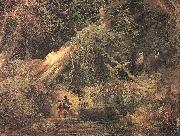Wholesale Oil Painting No Minimum |
|||||||||||
|
|
|||||||||||

|
|||||||||||
|
|
|
||||||||
Moran, ThomasAmerican Hudson River School Painter, 1837-1926 American painter and printmaker of English birth. His brothers Edward (1829-1901), John ( 1831-1902) and Peter (1841-1914) were also active as artists. His family emigrated from England and in 1844 settled in Philadelphia where Moran began his career as an illustrator. He was guided by his brother Edward, an associate of the marine painter James Hamilton, whose successful career afforded an example for Moran. Between the ages of 16 and 19 Moran was apprenticed to the Philadelphia wood-engraving firm Scattergood & Telfer; he then began to paint more seriously in watercolour and expanded his work as an illustrator. In the 1860s he produced lithographs of the landscapes around the Great Lakes. While in London in 1862 (the first of many trips to England), he was introduced to the work of J. M. W. Turner, which remained a vital influence on him throughout his career. Moran owned a set of the Liber studiorum and was particularly impressed by Turner's colour and sublime conception of landscape. With his wife, Mary Nimmo Moran (1842-99), an etcher and landscape painter, he participated in the Etching Revival, scraping fresh and romantic landscapes and reproductive etchings |
||||||||
|
|
||||||||
Slaves Escaping Through the Swamp
Slaves Escaping Through the Swamp Painting ID:: 19512 |
1862
Oil on canvas
Philbrook Museum of Art, Tulsa, OK. 1862 Oil on canvas Philbrook Museum of Art, Tulsa, OK. |
|||||||
|
|
||||||||
|
Moran, Thomas American Hudson River School Painter, 1837-1926 American painter and printmaker of English birth. His brothers Edward (1829-1901), John ( 1831-1902) and Peter (1841-1914) were also active as artists. His family emigrated from England and in 1844 settled in Philadelphia where Moran began his career as an illustrator. He was guided by his brother Edward, an associate of the marine painter James Hamilton, whose successful career afforded an example for Moran. Between the ages of 16 and 19 Moran was apprenticed to the Philadelphia wood-engraving firm Scattergood & Telfer; he then began to paint more seriously in watercolour and expanded his work as an illustrator. In the 1860s he produced lithographs of the landscapes around the Great Lakes. While in London in 1862 (the first of many trips to England), he was introduced to the work of J. M. W. Turner, which remained a vital influence on him throughout his career. Moran owned a set of the Liber studiorum and was particularly impressed by Turner's colour and sublime conception of landscape. With his wife, Mary Nimmo Moran (1842-99), an etcher and landscape painter, he participated in the Etching Revival, scraping fresh and romantic landscapes and reproductive etchings Slaves Escaping Through the Swamp mk195 1863 Oil on canvas 32x43 |
||||||||
|
|
||||||||
|
Prev Next
|
||||||||
|
|
||||||||
|
Related Paintings to Moran, Thomas :. |
||||||||
|
|
||||||||
|
CONTACT US |

